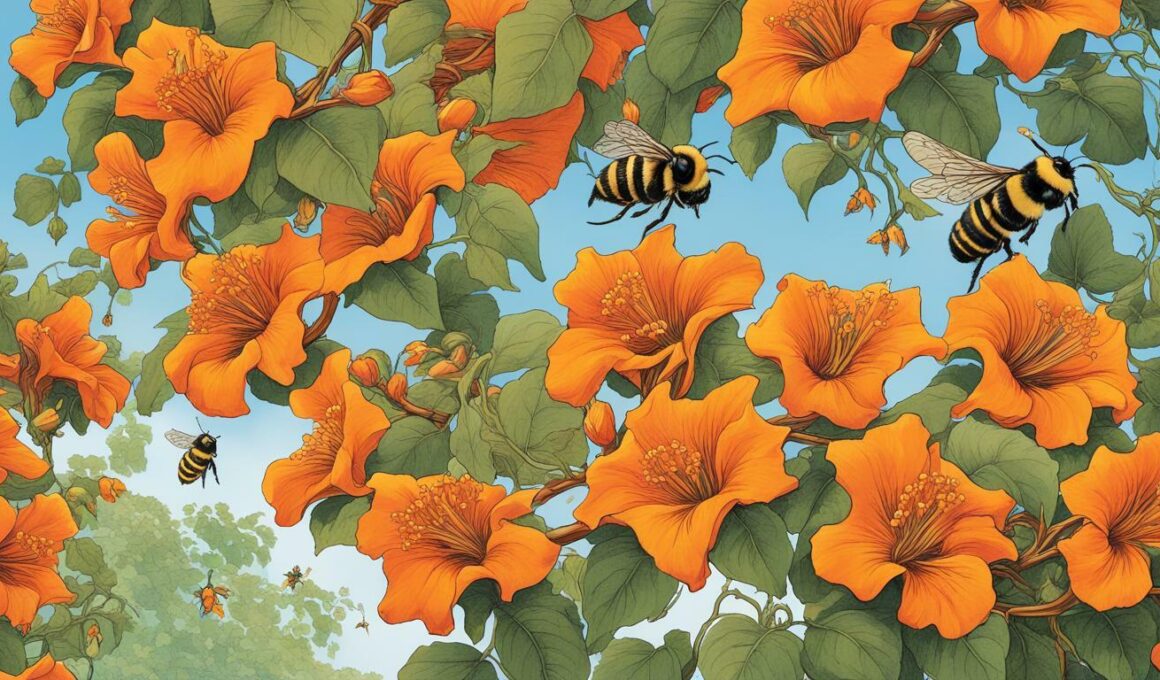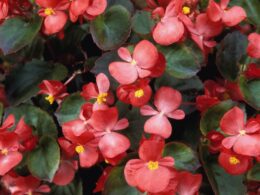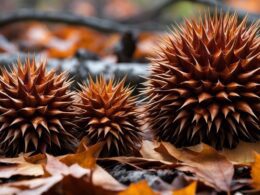If you’re looking to attract bees to your garden, you may be wondering if trumpet vines are a good addition. These vibrant plants are known for their cascading blossoms and lush foliage, but do they also have the power to attract bees? In this article, we’ll explore the relationship between trumpet vines and bees, and dive into the factors that make them appealing to these important pollinators.
Post Summary:- Trumpet vines are known for their eye-catching blossoms and lush foliage.
- Bees find trumpet vines appealing due to the plants’ bright colors and abundant nectar.
- Trumpet vines and bees have a mutually beneficial relationship, with bees benefiting from the nectar and pollen provided by the trumpet vines, while the vines rely on bees for pollination.
- By incorporating trumpet vines into your garden, you can create an ecosystem that supports bee populations and the overall health of your garden.
The Allure of Trumpet Vines for Bees
If you want to attract bees to your garden, planting trumpet vines may be a great place to start. Bees are naturally drawn to the bright blooms and sweet nectar of these gorgeous plants.
Trumpet vines are known for their showy orange or red flowers, which can be up to three inches long, making them easy for bees to spot and access. Additionally, the trumpet vine’s nectar-producing glands are located at the base of the flower, which means that the nectar is readily available for bees to collect.
Another aspect that makes trumpet vines so appealing to bees is their long blooming period. Trumpet vines will typically bloom from mid-summer to early fall, providing a continuous source of nectar for bees during that time.
The Allure of Trumpet Vines for Bees
Here are some tips for maximizing the attractiveness of trumpet vines for bees:
- Plant trumpet vines in a sunny location. Bees are attracted to warm, sunny areas.
- Provide a source of fresh water for bees. They need water to drink and cool off.
- Plant different varieties of trumpet vines. Different species of bees may prefer different types of flowers.
Fun fact: Hummingbirds are also attracted to trumpet vines, making them a great addition to any pollinator-friendly garden.
Overall, trumpet vines are a beautiful and beneficial addition to any garden looking to attract bees and other pollinators. Providing a food source for bees can help support their populations and contribute to a thriving garden ecosystem.
Bees and Trumpet Vines: A Symbiotic Relationship
When you plant trumpet vines in your garden, you are not only adding a stunning and vibrant feature to your outdoor space, but you are also creating a mutually beneficial relationship with bees. Bees play a crucial role in pollinating plants, and trumpet vines rely on bees to reproduce.
Bees are attracted to the bright colors and abundant nectar of the trumpet vine flowers. As the bees feed on the nectar, they unknowingly transfer pollen from flower to flower, fertilizing the plant and ensuring its survival. In return, the trumpet vine provides a valuable food source for the bees, supporting their populations and contributing to the overall health of the ecosystem.
Trumpet Vines as Bee-Friendly Plants
If you’re looking to support bee populations in your garden, trumpet vines are an excellent choice. These plants are highly attractive to bees and can provide a valuable source of nectar and pollen.
Trumpet vines are also well-suited to creating an ecosystem that supports bee populations. Their hardy and vigorous growth habit can provide ample shelter and nesting sites for bees, while their abundant blooms can sustain a steady food source.
But bees aren’t the only pollinators that trumpet vines can attract. Other insects, such as butterflies and hummingbirds, are also drawn to the vibrant blossoms of these plants. This can help to increase the overall biodiversity of your garden.
If you’re interested in cultivating trumpet vines for bee support, it’s important to choose a sunny location with well-draining soil. Trumpet vines also benefit from regular pruning to promote healthy growth and blooms.
With a little care and attention, trumpet vines can be a valuable addition to your outdoor space, supporting not only bees but a range of other beneficial insects as well.
Impact of Trumpet Vines on Bee Populations
If you’re looking to attract bees to your garden, consider planting trumpet vines. These plants provide an abundant source of nectar and pollen for bees, making them an essential part of any bee-friendly ecosystem. By incorporating trumpet vines into your outdoor space, you may be helping to support the health and diversity of bee populations in your area.
In addition to providing food for bees, trumpet vines can also provide shelter and habitat for these important pollinators. The dense foliage and climbing structure of the plant can offer a safe haven for bees to rest and nest, helping to promote their overall well-being.
The presence of trumpet vines in your garden can also have a positive impact on bee diversity. By providing a diverse range of plant species, you can attract different species of bees to your garden, helping to promote a healthy and varied ecosystem. Trumpet vines, with their showy blossoms and easy-to-access nectar, can help to attract a wide variety of bees to your garden.
Adding trumpet vines to your outdoor space can also have a positive impact on the overall health of your garden ecosystem. By attracting bees, you can promote the pollination of other plants in your garden, leading to healthier and more abundant blooms. In this way, trumpet vines can help to enhance the beauty and productivity of your garden while supporting bee populations.
Cultivating Trumpet Vines for Bees
If you’re looking to attract bees to your garden, cultivating trumpet vines is a great way to do it. Here are some tips for maximizing their appeal to bees:
- Plant in a sunny location: Trumpet vines thrive in full sun, so make sure to plant them in an area that gets at least six hours of direct sunlight per day.
- Provide support: These vines can grow over 30 feet long, so make sure to provide sturdy support for them to climb. Adding a trellis or arbor can be a great option.
- Water regularly: Trumpet vines require consistent moisture, so make sure to water them regularly, especially during hot and dry periods.
- Prune appropriately: To encourage the growth of new blossoms and prevent the vine from becoming too dense, prune trumpet vines in the late winter or early spring before new growth begins.
- Ensure appropriate spacing: Plant trumpet vines at least ten feet apart to provide enough space for the vine to grow and for bees to access the blossoms.
By following these tips, you can create an inviting environment for bees that can help them thrive in your garden. In turn, the presence of bees can enhance the health and beauty of your outdoor space and contribute to the overall ecological balance.
How Do Bees Interact with Trumpet Vine Seeds?
Bees play a crucial role in the pollination of trumpet vine plants. As they buzz around, they unintentionally deposit trumpet vine seed appearance onto the stigma, leading to fertilization. This interaction helps in the dispersal of these seeds, ensuring the successful reproduction and growth of trumpet vine plants.
Enhancing Your Outdoor Space with Trumpet Vines and Bees
Adding trumpet vines to your outdoor space not only enhances its aesthetic appeal but also improves the ecosystem for bees. The vibrant and cascading flowers of trumpet vines can create a stunning visual display in your garden, attracting the attention of both bees and humans.
By planting trumpet vines in your garden, you can create a bee-friendly environment that supports their pollination efforts. Bees play an important role in maintaining the balance of the ecosystem, and by providing them with a habitat rich in nectar and pollen, you can contribute to their well-being.
The presence of bees in your garden also benefits the health of your plants. Bees help pollinate flowers, resulting in better yield and quality for fruits and vegetables. In turn, these flowers provide bees with the vital nutrients they need to thrive.
Incorporating trumpet vines into your garden can also attract other pollinators besides bees, such as hummingbirds and butterflies. These beautiful creatures can add to the charm of your outdoor space while contributing to the health of the ecosystem.
With just a little effort, you can cultivate your trumpet vines to create an inviting environment for bees and other pollinators. By providing them with the necessary resources, you can help promote their well-being and contribute to the overall health of the ecosystem.
Conclusion: The Bee-Attracting Power of Trumpet Vines
By now, you’ve learned that trumpet vines are a magnet for bees, attracting them with their bright colors and abundant nectar. Not only do bees benefit from the nectar and pollen provided by the trumpet vines, but the trumpet vines also rely on bees for pollination. Together, they form a symbiotic relationship that’s vital to the ecosystem.
Not only are trumpet vines bee-friendly plants, but they also contribute to creating an ecosystem that supports bee populations and the overall health of your garden. The presence of trumpet vines in your garden can enhance the availability of food and shelter for bees, potentially benefitting their overall numbers and diversity.
If you’re looking to attract bees to your garden, consider incorporating trumpet vines into your outdoor space. With their vibrant and cascading blossoms, they can enhance the beauty of your garden while supporting bee populations. Remember to take care of your trumpet vines by providing them with the right planting conditions, care, and maintenance to ensure they become a bee-friendly haven.
Overall, trumpet vines have a powerful bee-attracting ability and the potential to create a flourishing garden ecosystem. By cultivating trumpet vines, you can contribute to enhancing bee populations and promoting ecological balance. So why not add some trumpet vines to your garden and help support these vital pollinators?
Do Trumpet Vines Attract Ants?
Yes, trumpet vines can attract ants due to their sweet nectar. The presence of ants can help to pollinate the flowers, but they can also protect the plant from harmful pests. It’s important to find a balance, as too many ants can also cause issues for the vines. For more ants eating grass information, consult a professional for advice.
FAQ
Q: Do trumpet vines attract bees?
A: Yes, trumpet vines are known to attract bees.
Q: What makes trumpet vines attractive to bees?
A: Bees are drawn to the bright colors and abundant nectar of trumpet vines.
Q: How can I maximize the attractiveness of trumpet vines for bees?
A: To attract more bees to your trumpet vines, make sure to provide proper care and maintenance, and create an inviting environment with other bee-friendly plants.
Q: Are trumpet vines beneficial for bees?
A: Yes, trumpet vines provide bees with a source of nectar and pollen, while bees help in the pollination of the trumpet vines, creating a mutually beneficial relationship.
Q: Do trumpet vines attract other pollinators besides bees?
A: Yes, trumpet vines can also attract other pollinators, such as butterflies and hummingbirds.
Q: How can trumpet vines impact bee populations?
A: Trumpet vines can enhance the availability of food and shelter for bees, potentially benefiting their overall numbers and diversity in your garden.
Q: How can I cultivate trumpet vines to attract bees?
A: To cultivate trumpet vines for bees, ensure proper planting, care, and maintenance. Additionally, create a bee-friendly environment by providing other resources like water and shelter.
Q: What are the benefits of incorporating trumpet vines into my outdoor space?
A: Trumpet vines not only add beauty to your garden but also attract bees, which play a vital role in the overall health and ecosystem of your garden.








